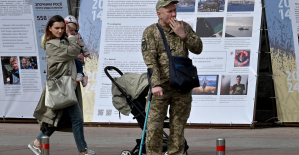Somewhere in the south. The hills are pleasant. The harvest is brought in. It's warm. The sun is high in the sky. The streets on the outskirts of the small, small town are empty. On the edge, where the homes are. In a circle around an empty center. And with no way out.
There, on the fringes, Germany is always a particularly dangerous place on a Sunday evening. Envy and resentment and domestic violence grow. That is where the dangerous appearance of the bourgeoisie resides. People observe other people suspiciously. People trust other people with everything. And quite often rightly so.
Sandra Vogt lives there. That's what the new Black Forest "crime scene" wants. It's called "The Views of Others". Bernd Lange wrote it. Franziska Schlotterer directed.
Sandra has two children – Lukas has reached the end of puberty, Jonas is ten – a husband, no worries. They have just been awarded three million. When Sandra is in office, everyone, especially the men, always wants to see her. She didn't always live there. That's a problem.
She can do whatever she wants, she will never belong. Mistrust will always be with her. What is she doing wrong? Nothing. She is wrong. She is Sandra. And Sandra is just Sandra. That's enough for her rejection. Through the mother-in-law. Through the neighbor who meticulously keeps records of everything the Vogts do.
She doesn't know what happened on the night it's about. There is a lot of blood in the bedroom, enough that Sandra's husband would not have survived the loss. The man has disappeared, as has Jonas. Sandra is still there. And has to live with the hatred of the citizens and the suspicions of the investigators.
Being wrong on the bourgeois German fringes is of course not a problem in Breisgau. That would also work in the Old Country and in Lusatia. However, Sandra would not meet inspectors like Franziska Tobler and Friedemann Berg. They're not the fastest. But they would win every crime scene detective empathy award we have yet to come up with. Subjecting this fundamental and fundamentally good empathy to a continuous stress test must be the clandestine program of the responsible SWR editorial team.
In the case of Sandra, the target of the stress test is primarily Friedemann Berg. He would like to relieve Sandra. He sees her desperation, sees how she is becoming more and more self-conscious that she is not suspect because the others think she is guilty. He builds more bridges for her than the Breisgau has rivers. But Sandra doesn't go over any.
You just have to confess. Or say where she was the night whatever really happened. And with whom. Or she would have to confess at all. But she doesn't do any of that. Gradually, in flashbacks, in staged statements, a dysfunctional panorama unfolds, in which there is not a single sympathetic character, including Sandra. If you disregard Tobler and Berg.
The man a choleric asshole. Nobody understands how Sandra got to him. The companion a slimy little spirit. The son is an absolute father-child who treats his mother like a mangy dog. Really developing sympathy for the stubborn Sandra, because one admires Friedemann Berg very much for his patience, is difficult anyway.
It's going slowly. It remains foreign to you. You only develop a longing for a summer in Breisgau. That's a little bit in the long run.

 Poland, big winner of European enlargement
Poland, big winner of European enlargement In Israel, step-by-step negotiations for a ceasefire in the Gaza Strip
In Israel, step-by-step negotiations for a ceasefire in the Gaza Strip BBVA ADRs fall almost 2% on Wall Street
BBVA ADRs fall almost 2% on Wall Street Ukraine has lost 10 million inhabitants since 2001... and could lose as many by 2050
Ukraine has lost 10 million inhabitants since 2001... and could lose as many by 2050 Sánchez cancels his agenda and considers resigning: "I need to stop and reflect"
Sánchez cancels his agenda and considers resigning: "I need to stop and reflect" The Federal Committee of the PSOE interrupts the event to take to the streets with the militants
The Federal Committee of the PSOE interrupts the event to take to the streets with the militants Repsol: "We want to lead generative AI to guarantee its benefits and avoid risks"
Repsol: "We want to lead generative AI to guarantee its benefits and avoid risks" Osteoarthritis: an innovation to improve its management
Osteoarthritis: an innovation to improve its management Ukraine gets a spokesperson generated by artificial intelligence
Ukraine gets a spokesperson generated by artificial intelligence The French will take advantage of the May bridges to explore France
The French will take advantage of the May bridges to explore France Organic flour contaminated by a recalled toxic plant
Organic flour contaminated by a recalled toxic plant 2024 Olympics: Parisian garbage collectors have filed a strike notice
2024 Olympics: Parisian garbage collectors have filed a strike notice Death of Paul Auster: Actes Sud says he is “lucky” to have been his publisher in France
Death of Paul Auster: Actes Sud says he is “lucky” to have been his publisher in France Lang Lang, the most French of Chinese pianists
Lang Lang, the most French of Chinese pianists Author of the “New York Trilogy”, American novelist Paul Auster has died at the age of 77
Author of the “New York Trilogy”, American novelist Paul Auster has died at the age of 77 To the End of the World, The Stolen Painting, Border Line... Films to watch this week
To the End of the World, The Stolen Painting, Border Line... Films to watch this week Omoda 7, another Chinese car that could be manufactured in Spain
Omoda 7, another Chinese car that could be manufactured in Spain BYD chooses CA Auto Bank as financial partner in Spain
BYD chooses CA Auto Bank as financial partner in Spain Tesla and Baidu sign key agreement to boost development of autonomous driving
Tesla and Baidu sign key agreement to boost development of autonomous driving Skoda Kodiaq 2024: a 'beast' plug-in hybrid SUV
Skoda Kodiaq 2024: a 'beast' plug-in hybrid SUV The home mortgage firm rises 3.8% in February and the average interest moderates to 3.33%
The home mortgage firm rises 3.8% in February and the average interest moderates to 3.33% This is how housing prices have changed in Spain in the last decade
This is how housing prices have changed in Spain in the last decade The home mortgage firm drops 10% in January and interest soars to 3.46%
The home mortgage firm drops 10% in January and interest soars to 3.46% The jewel of the Rocío de Nagüeles urbanization: a dream villa in Marbella
The jewel of the Rocío de Nagüeles urbanization: a dream villa in Marbella Europeans: a senior official on the National Rally list
Europeans: a senior official on the National Rally list Blockade of Sciences Po: the right denounces a “drift”, the government charges the rebels
Blockade of Sciences Po: the right denounces a “drift”, the government charges the rebels Even on a mission for NATO, the Charles-de-Gaulle remains under French control, Lecornu responds to Mélenchon
Even on a mission for NATO, the Charles-de-Gaulle remains under French control, Lecornu responds to Mélenchon “Deadly Europe”, “economic decline”, immigration… What to remember from Emmanuel Macron’s speech at the Sorbonne
“Deadly Europe”, “economic decline”, immigration… What to remember from Emmanuel Macron’s speech at the Sorbonne These French cities that will boycott the World Cup in Qatar
These French cities that will boycott the World Cup in Qatar Top 14: Fijian hooker Narisia leaves Racing 92 and signs for Oyonnax
Top 14: Fijian hooker Narisia leaves Racing 92 and signs for Oyonnax Europa League: Jean-Louis Gasset is “wary” of Atalanta, an “atypical team”
Europa League: Jean-Louis Gasset is “wary” of Atalanta, an “atypical team” Europa League: “I don’t believe it…”, Gasset jokes about Aubameyang’s age
Europa League: “I don’t believe it…”, Gasset jokes about Aubameyang’s age Foot: Rupture of the cruciate ligaments for Sergino Dest (PSV), absent until 2025
Foot: Rupture of the cruciate ligaments for Sergino Dest (PSV), absent until 2025
















